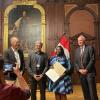
Martin Jung, a researcher in the Biodiversity, Ecology, and Conservation Research Group of the IIASA Biodiversity and Natural Resources Program has received the Society for Conservation Biology’s 2023 European Early Career Conservation Award for his outstanding contributions to conservation science.
The Society for Conservation Biology (SCB) Europe Section is a network of professionals working for the conservation of biodiversity with a special interest in European issues. The SCB annually honors achievements in conservation by professionals early in their careers. This year’s award went to IIASA researcher Martin Jung for his impactful work on integrated spatial planning and impact assessment of national and regional conservation and land-use policies.
At IIASA, Jung’s research focuses on the interconnection between land use, food production, biodiversity indicators, and conservation planning. He is particularly interested in incorporating high-quality biodiversity data into decision-making processes and has conducted studies on the impact of time lags on our understanding of biodiversity change and the effectiveness of conservation interventions. His research has contributed to the development of spatial and time-scale scenarios, offering insights into potential future outcomes for both people and nature.
Jung is also currently the Austrian lead investigator of the INSPIRE project. In this role, he leads the development of an integrated spatial planning framework for local-scale habitat conservation, restoration, and sustainable farming, with particular emphasis on sustainable water management in the Neusiedl See – Seewinkel region in eastern Austria. On a broader scale, he is actively involved in the Horizon Europe NaturaConnect project, where he serves as a member of the project management committee and work package leader. In addition, he is contributing to the EU BIOCLIMA project, which assesses the impact of different forestry, food production and climate change mitigation scenarios on European biodiversity.
Jung’s research has also had impact at the global scale. His analysis of areas of significance for biodiversity, carbon, and water, for example, has supported several countries in identifying priority areas for multiple objectives under an integrated spatial planning framework. He created a new modeling framework to flexibly integrate different sources of biodiversity data (ibis.iSDM), which is already applied in a range of EU funded IIASA projects. His work has also influenced the regional and national strategies for landscape planning and supporting sustainable food systems of The Nature Conservancy – a global environmental nonprofit organization.
IIASA proudly congratulates Martin Jung on this outstanding achievement and wishes him all the best in his future endeavors.
News

05 November 2024
How ecosystem restoration benefits national policies

04 November 2024
AmazonFACE inauguration video (launch of 2nd phase)

11 October 2024

